APPOINTMENTS
Anne Christophe, member of the Academy of Europe
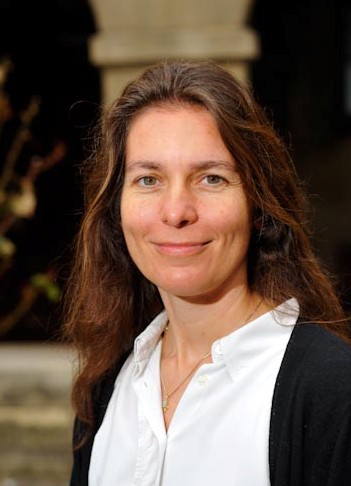
Anne Christophe, CNRS senior researcher and director of the Laboratoire de Sciences Cognitives et Psycholinguistique (LSCP), has been appointed member of the Academy of Europe.
The object of the Academy of Europe is the advancement and propagation of excellence in scholarship in the humanities, law, economics, the social and political sciences, mathematics, medicine, and all branches of natural and technological science. Their mission extends to science conducted anywhere in the world that is destined for public benefit and for the advancement of the education of citizens of all ages in Europe.
The Academy of Europe is a European, non-governmental organization acting as an Academy. The members are scientists and scholars who collectively aim to promote learning, education, and research. Founded in 1988, there are now nearly 3,500 members, including leading experts from the physical sciences and technology, biological sciences and medicine, mathematics, the letters and humanities, social and cognitive sciences, economics and law.
Anne Christophe's personal website
Academy of Europe
Daniel Andler, Académicien

Daniel Andler has been appointed at the Académie des sciences morales et politiques, in the philosophy section.
Daniel started his career as a mathematician, specializing in model theory. He taught mathematics at Université Paris Diderot and
other universities for about twenty years.
His interests then turned to the philosophy of science, in particular in relation to cognitive science.
He taught successively in Lille, in Nanterre, and at the Paris-Sorbonne University (Paris IV), where he created
the research unit "Science, norms, decisions". He is currently Professor Emeritus and Honorary Member of the Institut Universitaire
of France. At the École Normale Supérieure, he founded and directed the Department of Cognitive Studies from 2001 to 2005.
In 2006, he created the Compas Group, a think tank devoted to the relationship between education, cognition, and new technologies.
Daniel Andler’s personal website
Académie des sciences morales et politiques
FUNDING
"SIDES 3.0 project : Système Intelligent D’Enseignement en Santé"

The project SIDES 3.0 has obtained funding within the framework of the Développement d’Universités Numériques Expérimentales
(Development of Experimental Digital Universities—DUNE). It is coordinated by the French Digital University of Health and Sport
Science, which Franck Ramus (LSCP) is a partner of. This project proposes an architecture based on semantic web technologies to
construct an Intelligent Health Education System aimed at the training of, and the providing of personalized follow-up for all
medical students in France. It will be possible to automatically qualify their level, put in place a personalized recommendation
system, show students how they evolve over time, and allow them to compare themselves to different groups of students.
Teachers will be guided on the missing content or points to be clarified. They will have at their disposal a standardized
digital knowledge-sharing environment as well as an in situ experimental tool for pedagogy, all while continuing scientific
research on education and learning.
Launched in October 2016, the call for projects Développement d’Universités Numériques Expérimentales (DUNE),
managed by the French National Agency for Research (ANR), is consistent with the priority given by the Ministry of
Education to the digital transformation of educational institutions, and fits into the framework of the investment program for the future.
Find out more about DUNE’s call for project proposals
AUDIO/VIDEO
Workshop "Quel visage pour une théorie du design ?" (Which face for a theory of design?)
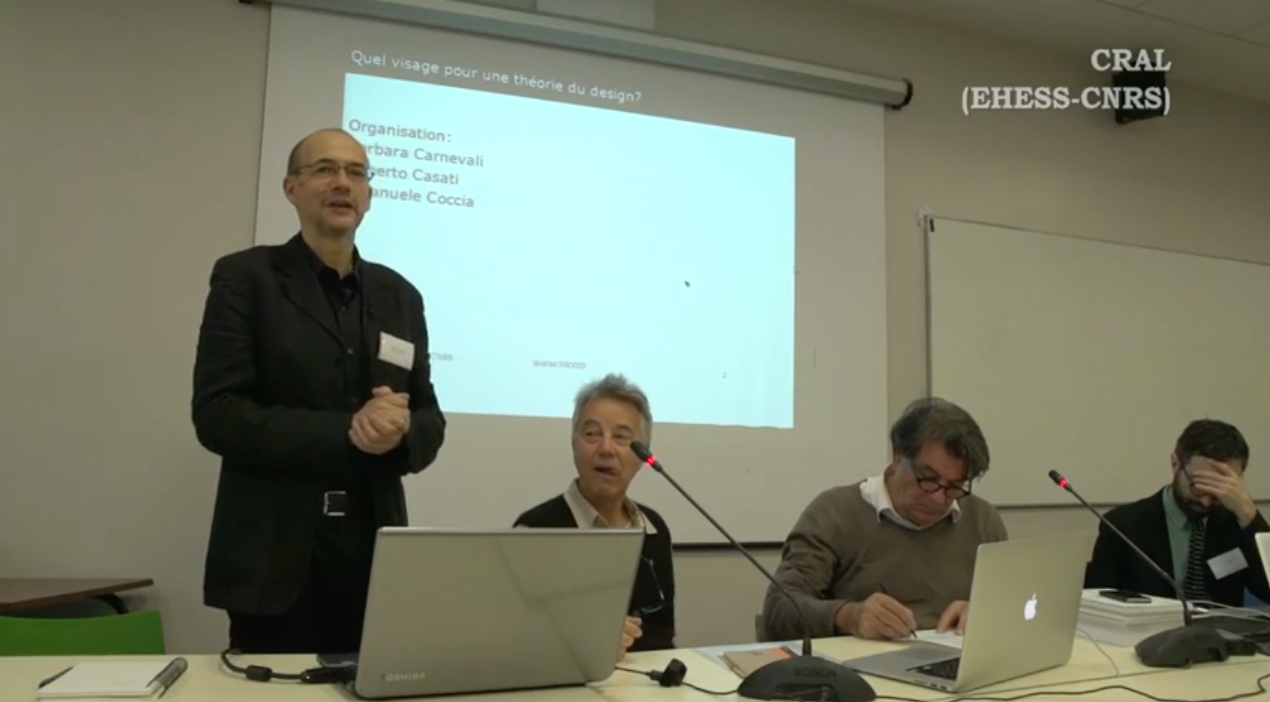
The workshop "Quel visage pour une théorie du design ?" (Which face for a theory of design?) took place on November 21, 2016. It was organized by Barbara Carnevali (CRAL), Roberto Casati (IJN) and Emanuele Coccia (CEHTA).
Watch the videos
More information about the workshop
Comparing the difficulty of different types of linguistic generalizations - LouAnn Gerken (University of Arizona)

The audio recording of LouAnnGerken’s talk at the DEC colloquium is available on the SavoirsENS website.
Abstract:
Over half a century ago, Shepard, Hovland, and Jenkins (1961), described 6 types of category structures, ranging from single feature categories
(e.g., all red things), which allow easy generalization to new category members, to arbitrary categories, which must be memorized. I will begin
with an overview of their category types as well as older and newer experimental work that documents the ease with which adults and non-human
animals are able to learn different types. I will then draw parallels between the Shepard et al. categories and the kinds of generalizations
that infants must make to learn a language. Finally, I will attempt to show that infant generalization in several laboratory language learning experiments is consistent with adult and animal learning of the Shepard et al. category structures.
Listen to the talk
MEDIAS
"Faut-il se méfier de nos amitiés numériques?" (Should we be wary of our digital friendships?)
How far does a digital friendship engage us? How should we manage digital friendships when they affect our "e-reputation"?
Gloria Origgi (CNRS, Institut Jean Nicod) participated in the show Du Grain à moudre on France Inter on January 18th.
Podcast
ADAPTATION 4X30
Last stage of the solo mission: Siberia
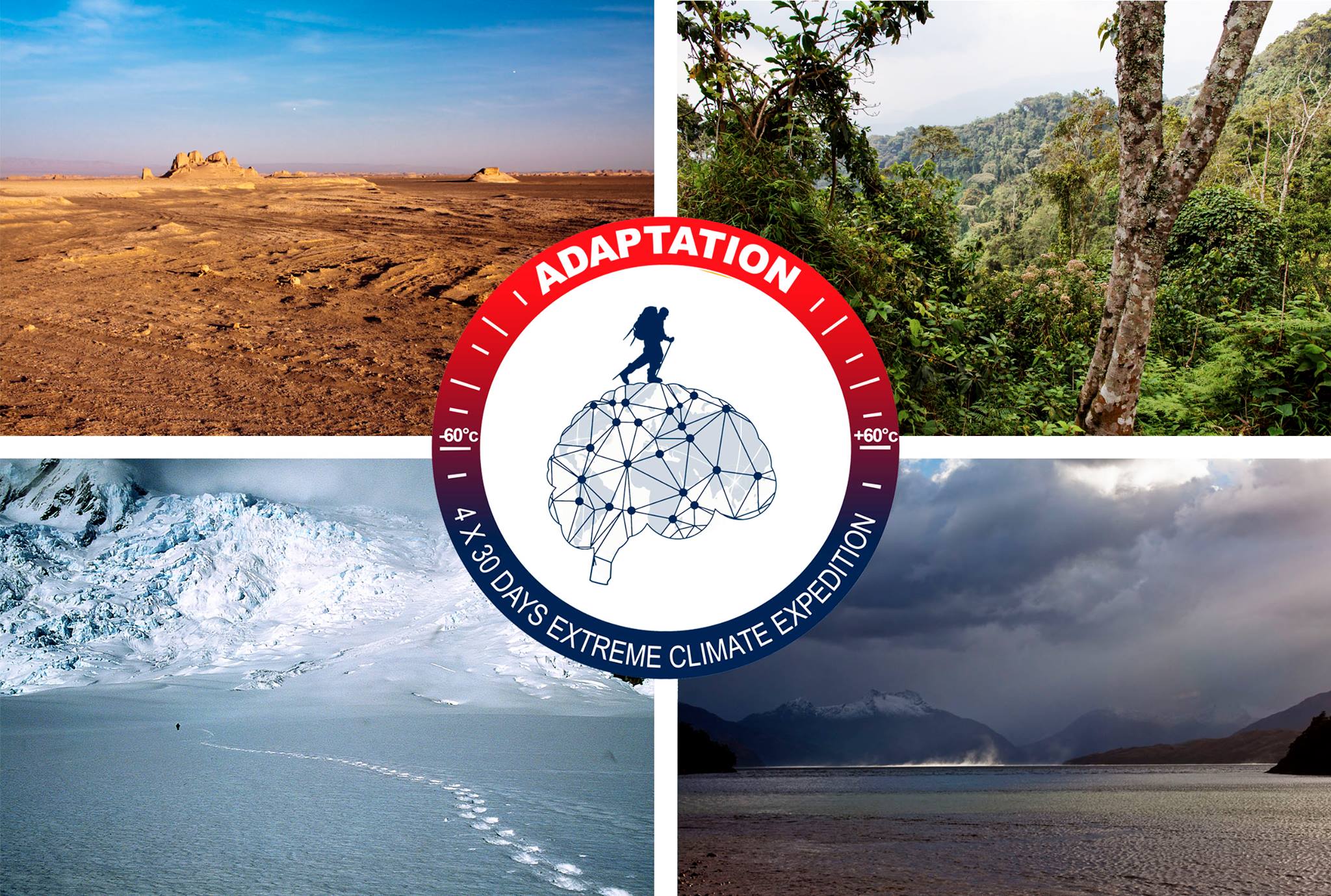
Christian Clot, who was in the Amazon rainforest (extreme heat and humidity) just a couple of weeks ago, is now in Siberia,
the fourth and last stage of the first part of the Adaptation expedition. There is no known location outside the center of
the Antarctic as cold and arid as the interior of eastern Siberia where temperatures can reach - 65° C. This territory’s
cold and isolation are ideal for studies conducted by the Adaptation team. The crossing will be done on skis while pulling
a pulka over a distance of about 450 km, in the Verkhoyan Mountains in Yakutia, straddling the Arctic Circle. The cold will
be extreme, but the few hours of daylight will allow the carrying out of the studies.
The analysis of the data collected during these four crossings will begin at the end of the solo mission.
Follow the expedition on Facebook
Website of the expedition
SOME RECENT PUBLICATIONS
Chambon V, Farrer C, Pacherie E, Jacquet PO.,Leboyer M, Zalla T., Dec 28, 2016 Reduced sensitivity to social priors during action prediction in adults with autism spectrum disorders, Cognition
Abstract:
An extensive amount of evidence has documented a diminished ability to predict and understand other people’s action in individuals with autism spectrum
disorders (ASD). Recently, two theoretical accounts, the “Hypo-priors” and the “Aberrant precision” hypotheses, have suggested that attenuated Bayesian
priors or an imbalance of the precision ascribed to sensory evidence relative to prior expectations may be responsible for the atypical perceptual experience
and difficulties with action understanding in ASD. In the present study, we aimed to directly investigate whether difficulties in the appreciation of others’
intentions can be accounted for by abnormal interaction between these two types of information: (i) the sensory evidence conveyed by movement kinematics,
and (ii) the observer’s expectations, acquired from past experience or derived from prior knowledge. To test this hypothesis, we contrasted the ability to
infer Non-Social and Social intentions in adults with and without ASD, using a series of tasks in which both sensory evidence and prior expectations were
manipulated. The results showed that attenuated effect of prior expectations in ASD individuals does not result from a generalized impairment in mentalizing,
but one confined to social intentions. Attenuated priors in the social domain predicted the severity of clinical symptoms in the area of social interaction.
Importantly, however, we found that reduced priors in the social domain could be compensated by ASD through observational learning, i.e. through deriving
statistical regularities from observed behaviours. This capacity to balance reduced social expectations by learning inversely correlated with the severity
of repetitive and stereotyped behaviours. Collectively, these findings suggest that adults with ASD exhibit a disturbance in the inferential mechanism
that integrates sensory evidence into prior beliefs to produce accurate inferences about other people’s intentions.
Drugowitsch Jan, Wyart Valentin, Devauchelle Anne D., Koechlin Etienne., Dec 21, 2016,
Computational Precision of Mental Inference as Critical Source of Human Choice Suboptimality, Neuron.
Abstract:
Making decisions in uncertain environments often requires combining multiple pieces of ambiguous information from external cues.
In such conditions, human choices resemble optimal Bayesian inference, but typically show a large suboptimal variability whose origin
remains poorly understood. In particular, this choice suboptimality might arise from imperfections in mental inference rather than
in peripheral stages, such as sensory processing and response selection. Here, we dissociate these three sources of suboptimality
in human choices based on combining multiple ambiguous cues. Using a novel quantitative approach for identifying the origin and
structure of choice variability, we show that imperfections in inference alone cause a dominant fraction of suboptimal choices.
Furthermore, two-thirds of this suboptimality appear to derive from the limited precision of neural computations implementing
inference rather than from systematic deviations from Bayes-optimal inference. These findings set an upper bound on the accuracy
and ultimate predictability of human choices in uncertain environments.
Fani Koukouli, Marie Rooy, Dimitrios Tziotis, Kurt A. Sailor, Heidi C. O’Neill, Josien Levenga, Mirko Witte, Michael Nilges, Jean-Pierre Changeux,
Charles A. Hoeffer, Jerry A. Stitzel, Boris S. Gutkin, David A. DiGregorio & Uwe Maskos, (2017)
Nicotine reverses hypofrontality in animal models of addiction and schizophrenia. Nature Medicine. DOI: 10.1038/nm.4274
Résumé :
The prefrontal cortex (PFC) underlies higher cognitive processes1 that are modulated by nicotinic acetylcholine receptor (nAChR)
activation by cholinergic inputs2. PFC spontaneous default activity is altered in neuropsychiatric disorders,
including schizophrenia—a disorder that can be accompanied by heavy smoking. Recently, genome-wide association studies
(GWAS) identified single-nucleotide polymorphisms (SNPs) in the human CHRNA5 gene, encoding the α5 nAChR subunit,
that increase the risks for both smoking and schizophrenia. Mice with altered nAChR gene function exhibit PFC-dependent
behavioral deficits but it is unknown how the corresponding human polymorphisms alter the cellular and circuit mechanisms
underlying behavior. Here we show that mice expressing a human α5 SNP exhibit neurocognitive behavioral deficits in social
interaction and sensorimotor gating tasks. Two-photon calcium imaging in awake mouse models showed that nicotine can
differentially influence PFC pyramidal cell activity by nAChR modulation of layer II/III hierarchical inhibitory circuits.
In α5-SNP-expressing and α5-knockout mice, lower activity of vasoactive intestinal polypeptide (VIP) interneurons
resulted in an increased somatostatin (SOM) interneuron inhibitory drive over layer II/III pyramidal neurons.
The decreased activity observed in α5-SNP-expressing mice resembles the hypofrontality observed in patients with psychiatric
disorders, including schizophrenia and addiction. Chronic nicotine administration reversed this hypofrontality,
suggesting that administration of nicotine may represent a therapeutic strategy for the treatment of schizophrenia,
and a physiological basis for the tendency of patients with schizophrenia to self-medicate by smoking
C. Pelofi, V. de Gardelle, P. Egré, D. Pressnitzer, January 2, 2017, Interindividual variability in auditory scene analysis revealed by confidence judgements. Royal society publishing
Abstract:
Because musicians are trained to discern sounds within complex acoustic scenes, such as an orchestra playing,
it has been hypothesized that musicianship improves general auditory scene analysis abilities. Here, we
compared musicians and non-musicians in a behavioural paradigm using ambiguous stimuli, combining performance,
reaction times and confidence measures. We used ‘Shepard tones’, for which listeners may report either an upward
or a downward pitch shift for the same ambiguous tone pair. Musicians and non-musicians performed similarly on
the pitch-shift direction task. In particular, both groups were at chance for the ambiguous case. However, groups
differed in their reaction times and judgements of confidence. Musicians responded to the ambiguous case with
long reaction times and low confidence, whereas non-musicians responded with fast reaction times and maximal confidence.
In a subsequent experiment, non-musicians displayed reduced confidence for the ambiguous case when pure-tone components of
the Shepard complex were made easier to discern. The results suggest an effect of musical training on scene analysis:
we speculate that musicians were more likely to discern components within complex auditory scenes, perhaps because of
enhanced attentional resolution, and thus discovered the ambiguity. For untrained listeners, stimulus ambiguity was
not available to perceptual awareness.
This article is part of the themed issue ‘Auditory and visual scene analysis’.
Su, M., Peyre, H., Song, S., McBride, C., Tardif, T., Li, H., Zhang, Y., Liang, W., Zhang, Z., Ramus, F., Shu, H., 2017, The influence of early linguistic skills and family factors on literacy acquisition in Chinese children: Follow-up from age 3 to age 11. Learning and Instruction, 49, 54–63.
Abstract:
The present longitudinal study investigated the predictive power of preschool linguistic skills and early family factors on children's comprehensive literacy
skills at the end of primary school in 262 Chinese children. The results indicated that a substantial (20–34%) share of variance of 5th grade
(age 11) literacy skills in Chinese could be explained by early family factors (age 3) and linguistic skills (age 3–age 5). Family socioeconomic
status and parent-child reading tuition were associated with different literacy measures. A differential pattern of prediction was also observed
among different literacy skills. Furthermore, path analyses indicated that the relationships between early family factors and literacy skills
at age 11 were mediated by specific linguistic and cognitive skills at preschool.
CALENDAR

February 2, 2017
SPS-AFIA-DEC Day
Entrée gratuite, réservation obligatoire
February 3, 2017
AECS seminar (IJN) - Justin Smith (Université Paris Diderot):
"Free Natural Beauties and the Question of Non-Human Art"
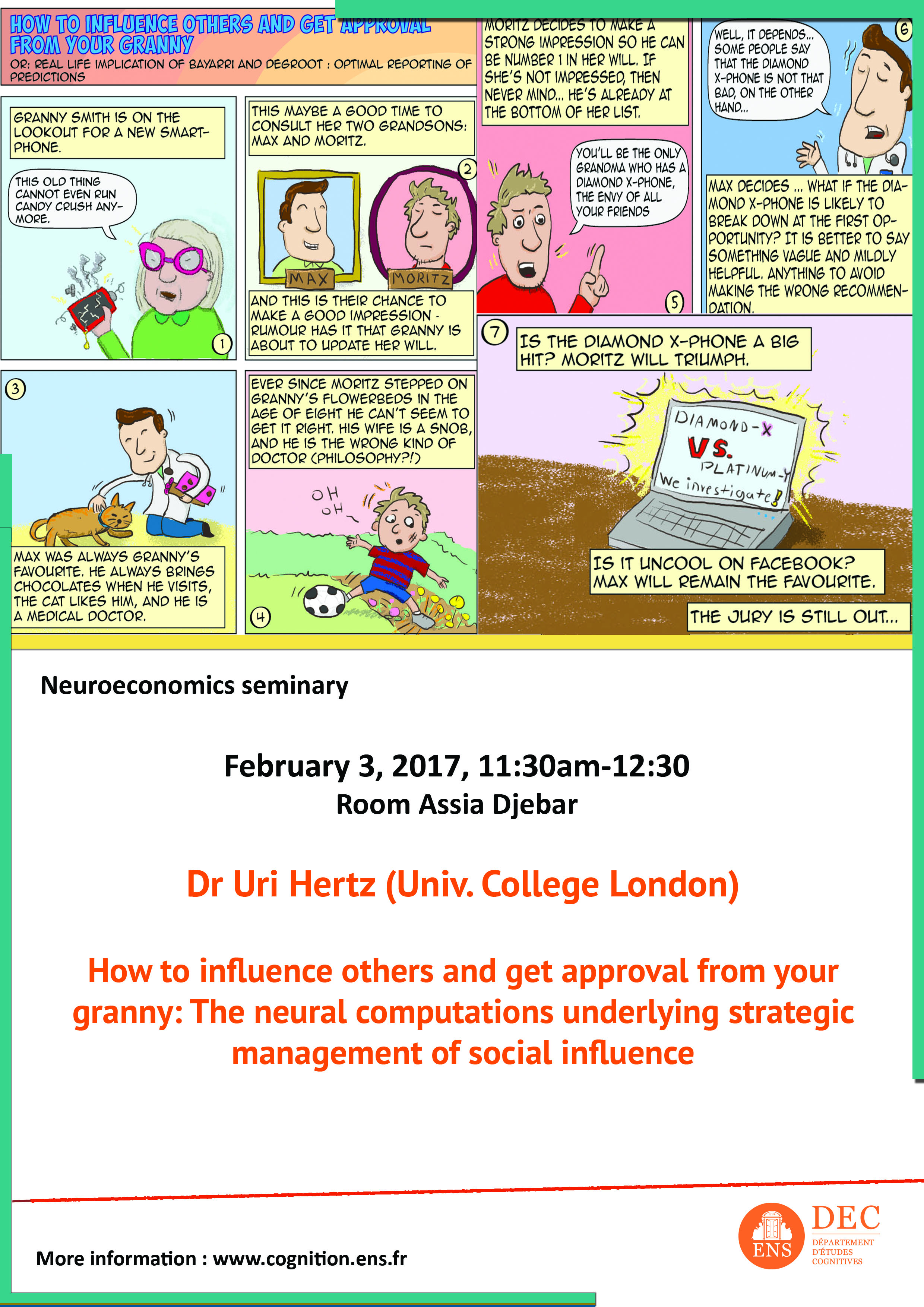
February 3, 2017
Social Cognition Seminar (LNC) - Dr Uri Hertz:
"How to influence others and get approval from your granny: The neural computations underlying strategic management of social influence"
February 7, 2017
PaCS seminar (IJN) - François Kammerer (Université Paris-Sorbonne, Paris IV): "Does the explanatory gap really arise from a fallacy?"
February 14, 2017
PaCS seminar (IJN) - Frederic Nef (EHESS, IJN): "Normes et valeurs : primauté et différence"
February 15, 2017
Metaethics seminar (IJN) - Paul Boswell (Université de Montréal/CRÉ): "Well-Being, the Good and Functioning"
February 17, 2017
AECS seminar (IJN) - Roger Pouivet (Archives Henry-Poincaré, Université Lorraine): "From Virtue Epistemology to Virtue Aesthetics"
February 21, 2017
DEC Colloquium - Emeran Mayer (UCLA): "Brain-gut interactions"
February 24, 2017
AECS seminar (IJN) - Tiziana Zalla (CNRS, IJN): "The Self and its emotions in fiction in adults with and without autism"
February 24, 2017
IJN colloquium - Josef Stern (University of Chicago): "Quotations and Pictures"
February 27, 2017
PaCS seminar (IJN) - Andrew Lee (NYU): "The Deep Structure of Experience"
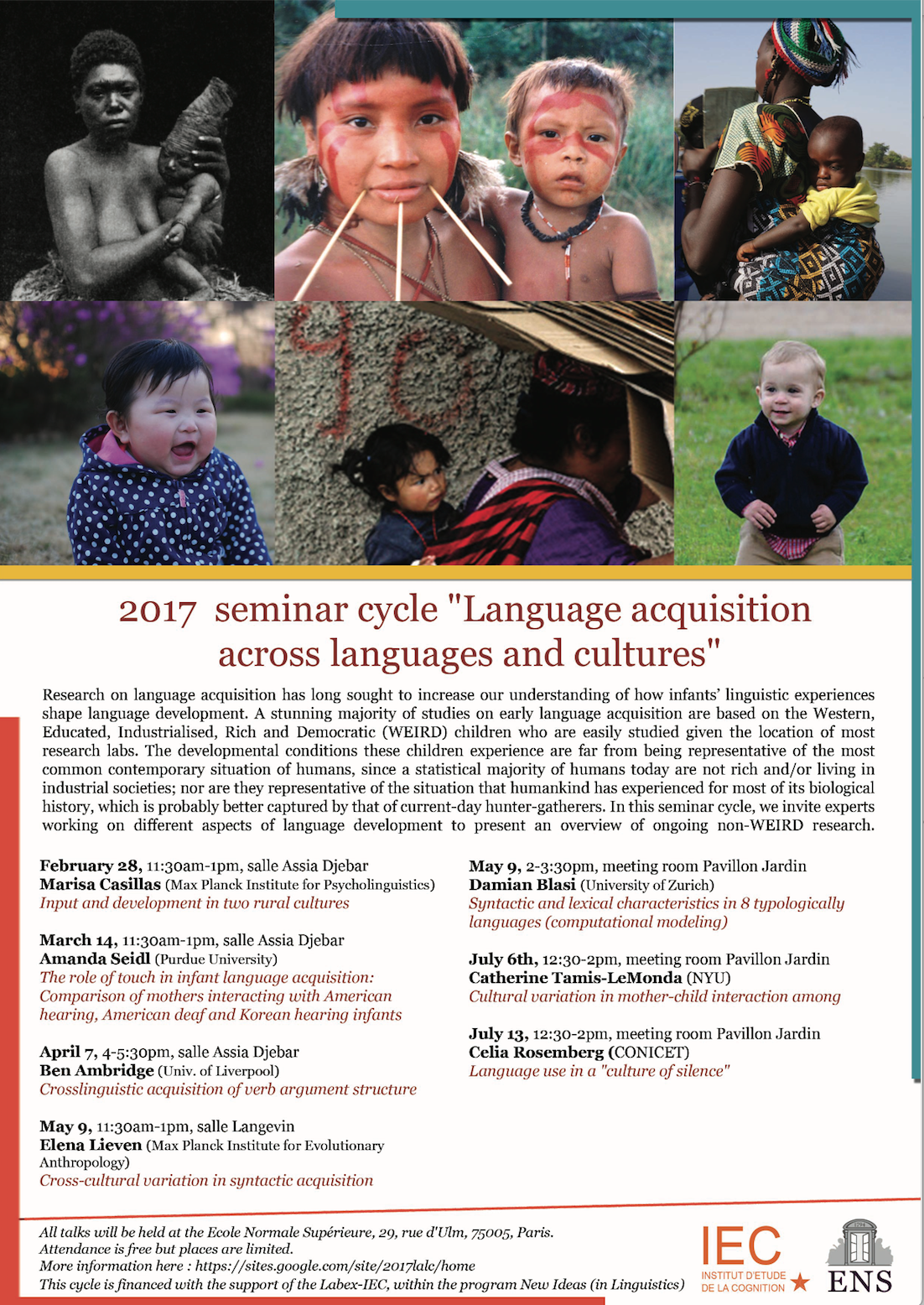
February 28, 2017
Cycle de séminaire "Language acquisition across languages and cultures" (LSCP) - Marisa Casillas (Max Planck Institute for Psycholinguistics) : "Input and development in two rural cultures"
DEC calendar available on: cognition.ens.fr
Susbcribe to the newsletter
Unsubscribe from the newsletter
